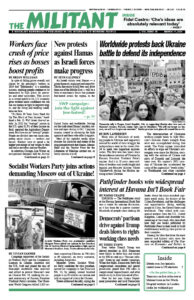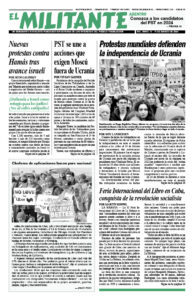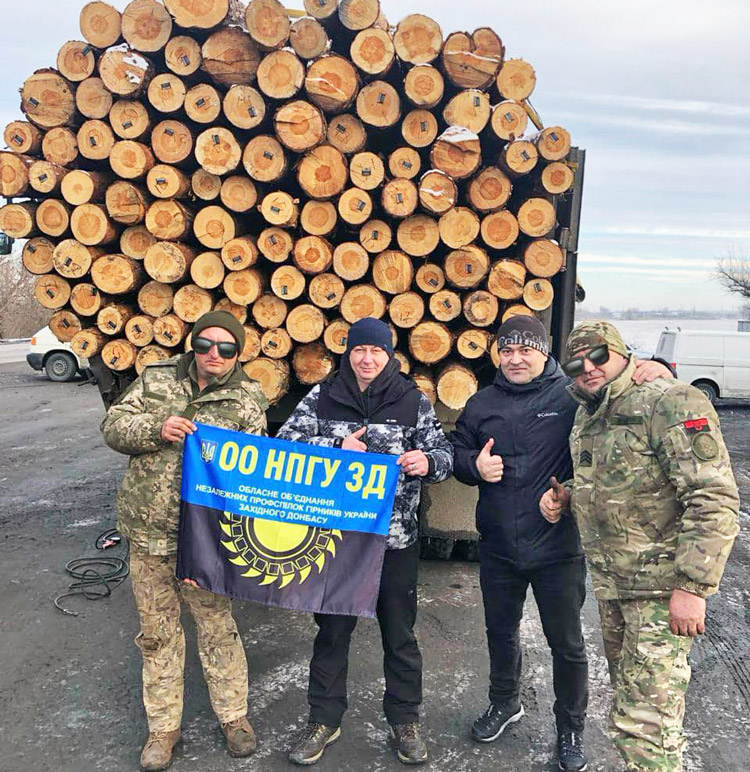“The priority now is defending Ukraine,” Mykhailo Volynets, chairperson of the Confederation of Free Trade Unions of Ukraine (KVPU) and of the Independent Trade Union of Miners of Ukraine, told the Militant in a phone interview Feb. 14. The vast majority of “union members want to join the fight” against Russian President Vladimir Putin’s war, “which is trying to destroy the country.”
The expansionist ambitions of the Putin regime “threaten a third world war,” Volynets warned.
As Moscow’s invasion enters its third year, the KVPU and the Federation of Trade Unions of Ukraine held a joint conference Feb. 22-24 appealing for international working-class solidarity. Several unionists of the General Union of Workers from Catalonia, Spain, met them and were taken on a tour of damage from Russian airstrikes in Kyiv. Since it is “hard to travel inside Ukraine” under wartime conditions, Volynets said, much of the Feb. 22-24 meeting for unionists internationally and within Ukraine would also be by video conference.
The war means the trade union movement in Ukraine faces “a lot of tasks in a complicated period,” Volynets said. Numerous local union leaders have volunteered to join the armed forces or territorial guard “to defend our country.” Many workers are toiling to fill the spots left vacant by those joining the country’s defense forces. This means “their workload has increased.”
Some 4 million people are displaced internally and another 6 million have been forced to flee the country because of the war. “The unions are working to aid many of these refugees,” he said. With “all the injured, disabled, and those who’ve lost family members,” unions have had to “provide services, not needed before in peacetime.”
The KVPU leader said there is a “high level of corruption” in Ukraine, which is “still a young country.” It gained independence in 1991 after the collapse of the Soviet Union.
Volynets said that Ukraine’s bosses had pushed the government of President Volodymyr Zelensky to pass a new labor law that “attacks workers rights.” It allows employers to tear up contracts and impose longer hours. The government wants to “deprive workers of using their unions to defend their rights.”
“It is not possible to take industrial action or hold rallies under martial law,” Volynets said. But after the war, there will be action “if nothing changes for the better for workers.”
The Independent Trade Union of Miners of Ukraine led mass strikes and protest marches in 1989 and 1991 as the Soviet Union disintegrated. The KVPU grew out of this. Volynets appealed for workers internationally to understand the need to support the independent unions of Ukraine.
Nearly 20% of the country is occupied, with Moscow’s offensive aiming to take more, he said. Some “30% of the territory is mined, making Ukraine one of the world’s most heavily mined countries.”
Russian missiles “can reach any target within the country,” Volynets said. “Ukraine lacks sufficient air defenses to protect all the cities. Some areas are under constant attack — schools, hospitals, including maternity facilities, and power stations.” Many airstrikes target electrical generators and power lines since the Kremlin knows “how cold the winters are in Ukraine.”
Numerous coal and iron ore mines have faced power blackouts from the war, sometimes trapping miners underground until power is restored. But miners have kept working underground, not only those near the Donetsk and Luhansk battlefields or Kryvyi Rih, but across the country. “Even in the western regions, electrical infrastructure has been damaged.”
One of the unions in the KVPU is the Free Trade Union of Railway Workers of Ukraine. Many rail workers have been killed or injured by these attacks but they try to keep the trains running “to help people get to work, or to evacuate,” with both “cargo and passenger trains targeted,” Volynets said. Pro-Kremlin saboteurs have hit rail lines and bridges, costing the lives and limbs of civilians and rail workers.
He stressed how grateful Ukrainian working people are for the solidarity and direct aid by unions from the U.S. to Europe. He noted that the government-sanctioned trade unions in Russia had supported Putin’s invasion “from the first days.”
“Getting the facts out” about what working people in Ukraine face is key to building international solidarity, Volynets said. This is vital to Ukraine’s survival, and will help it “continue to resist.”
Olesia Briazgunova, international secretary of the KVPU, translated for the interview.


